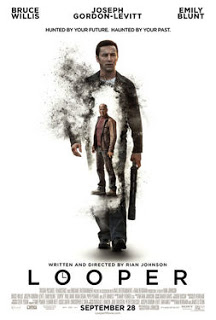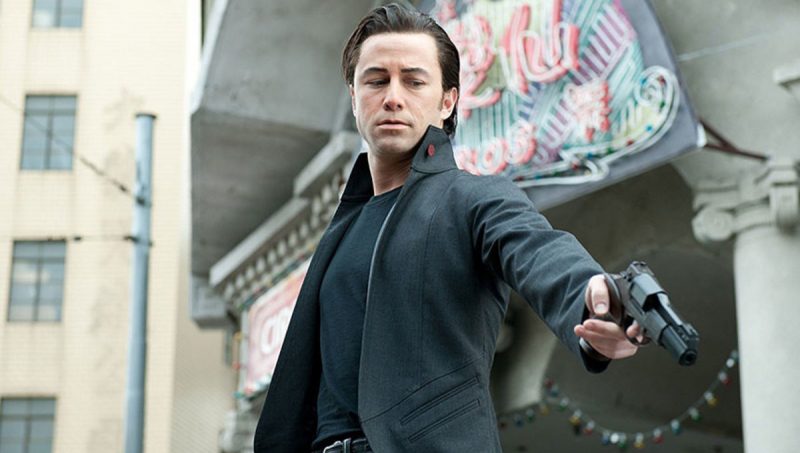Every so often a movie will come along that captivates movie reviewers and the statements you read about it make you wonder if, perhaps, someone at my theater switched it out for some inferior test version. Looper is a perfect example of that.
This time-travel film stars Joseph Gordon-Levitt as Joe (everyone in the film has only a first name) as a unique type of mob hit-man around 2044. In roughly 2074 time travel has been invented and the mafia uses that advancement to perfectly dispose of their enemies. Hiding bodies in the future is nearly impossible you see. They capture them in the present (2074), tie them up and blindfold them, and send them back to 2044 where hirelings like Joe kill them the instant they materialize in a predetermined spot and time. They then get rid of the bodies thus eradicating them from all existence in 2074. Clean…or so it seems.

There’s already a complication in that explanation but, like most time travel movies, there are many more to come and some of them are whoppers.
The movie starts out in a very compelling manner until about a third of the way in when it entirely runs out of magic and strays off into overly-long scenes that make it feel like a 1970’s B-movie.
I should warn you now that from here on I’ll be talking about a few things that I find to be major plot holes and that means exposing some plot points you may not want to read about. The first one every preview points out immediately so it shouldn’t be a surprise. Skip to the next-to-last paragraph if you want avoid any possible spoilers.
The assassins are called Loopers due to the loop-like nature of the dirty deed. Complications arise when the mob—eager to make sure they have no loose ends—decides it’s time to close the “loop”. They do this by abducting the older assassins and sending them back to their younger selves to be killed. Since they’re bound, with their heads covered, the younger version of them has no idea and kills them as they would any other target.
The killer is made aware of this closing and it’s celebrated by all. The hit-man is then set free from the mob with whatever money they’ve stashed from all their work to live out their next 30 years as they see fit. The only problem is that, every so often, a Looper catches on and can’t bring himself to close the loop. This is, we’re told, a very bad thing to do and, of course, it’s basically what happens when Joe’s future self (played by Bruce Willis) shows up in front of Joe to be killed.
The mob in 2044 is run by Abe (Jeff Daniels) and he’s actually been sent back from the future to make sure everything runs smoothly. As the trip is a one-way journey Abe is now a bit of unique person as everyone else who’s sent back is instantly killed. Abe explains that there are major consequences that multiply with each passing moment when an older Looper is on the loose. Thus, Loopers not closing the loop are of prime concern, and once Joe botches his contract all hell breaks loose.
Reviewers far and wide loved this film (it got a 94 of Rotten Tomatoes) and lauded it for avoiding all the typical problems with time travel stories. I beg to differ.
1. Why risk Looper’s not wanting to close the loop? Why send a future version of a Looper back to that Looper? Simply send them back to a different Looper who’d kill them without hesitation or complication.
2. How does the mob even know that a Looper didn’t close the loop? Somehow the mob instantly knows this kill didn’t take place. We’re never told how.
3. If people running around out of time are a huge problem, how do you explain Abe? He’s from the future and he’s been here without issue.
4. Why don’t they just kill people in the future and send them back to be disposed of? There is a bit of an answer to this one but it’s less than sufficient. People in the future have tracking devices in them and when they die perhaps these devices can alert authorities to their last known location. However, that’s weak. Kill them in one spot, drive them to the portal and send them back. Good luck proving anything. Also, wouldn’t the tracker be able to identify its last known location the instant before someone was sent back? Why not just maim the person, keeping them alive, but preventing them from any silly escape before sending them back?
5. How does Joe know when to be at the predetermined spot? The story makes a big deal of his setting up a plastic tarp in the middle of nowhere and watching his pocket watch intently. Is the movie suggesting that someone comes back on a preset schedule? Is killing in the future really that reliable? Doesn’t it risk issues in the future having to kidnap people on a very tight schedule?
I’m not even mentioning the myriad of typical time travel paradoxes that exist here.
There’s also a scene in the middle where we see Joe kill Old Joe the moment he materializes (in contrast to the main plot line). No explanation of this is ever provided. I suspect it was to suggest alternative time lines, but why?
Much of the last two-thirds of the film involves a plot-line with Sara (Emily Blunt) and her son, Cid, whom Old Joe believes is the future mob boss responsible for all the trouble. If he kills the kid he believes all will be set right. This brings us right to the plot of Terminator. Blunt is always great, but she can only do so much with the material given. The moment she showed up I wondered how long it would be before we’d get a Sarah Conner-esque love scene while praying it wouldn’t happen. Sadly, my prayers went unanswered in an awkward, entirely unnecessary segment.
Yet another plot line that defies explanation is that, for some reason, in 2044 a good chunk of people suddenly realize they’re telekinetic but, we’re told, all they can do is levitate small objects (mainly coins) a few inches above their hands. Seriously? Why, for the love of God, is that even needed in this film at all? The only explanation is to try to help explain another later ridiculous story element involving Cid. Needless to say, I wasn’t impressed.
Lastly, it appears much thought went into making Gordon-Levitt look like Willis but the effects don’t work at all. I never once felt as if they looked even remotely similar. Worse, the effect is just entirely distracting. Young Joe looks like some sort of animated mannequin. Even his attempts to act like Willis are distracting and miss the mark. Gordon-Levitt spends most scenes squinting and smirking like a crazy person.
My only recourse is to believe that movie reviewers from 2074 were sent back to 2012 to give this mess positive reviews in some plot to assure maximum profitability.



